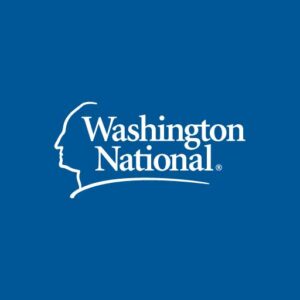
This is an advertisement and solicitation.
Things to do when a loved one dies
Here at Washington National, we’ve paid out more than $1.1 billion in life insurance claims since 1995. With so many claims paid, you won’t be surprised to hear that we help folks who have lost loved ones every day.
Through these daily interactions, we know that losing a loved one is a confusing and emotional event. The grieving process can put your emotions in constant fluctuation, from one extreme to another. While grieving, you may experience disbelief, shock, anger and sadness all in the same day.
And while your emotions are on a roller coaster, life goes on and the to-do list following your loved one’s death looms over you. There are many things to attend to, from planning the funeral to closing bank accounts. To say this process can be overwhelming is an understatement. At Washington National, we want to help you in your time of need, which is why we put together this simple guide on the things you need to do after a loved one passes away. We hope this information will help you during your difficult time.
Things to do after a loved one passes away:
Arrange organ donation
If your loved one is an organ donor (check his or her driver’s license, living will or health care proxy if you’re unsure), the arrangements for organ donation must be made almost immediately. If your loved one died in the hospital, they will help you there. If your loved one died outside of a hospital, contact the nearest hospital. This is also a good time to check the living will or health proxy to see if there are any body bequeathal instructions (for example, if they want their body donated to a medical school).
Contact key family members
Bringing everyone together will help you all grieve with support, and also begin planning the funeral. Once close family has all been notified, begin notifying close friends and extended family. Sometimes it can help to write out a list and brainstorm as many people as you can. Check the deceased’s contacts in his or her phone and email account. Also, be sure to contact your loved one’s employer, if necessary.
Take care of your loved one’s property
Be sure his or her home and vehicle(s) are locked and secured. If there are pets, make arrangements for them to be cared for. Set up a mail forward through the post office to prevent mail from accumulating at the deceased’s home.
Make funeral arrangements
Key family members should be together for early
conversations about planning the funeral. Some people choose a funeral home and
even prepay for their services before they pass away. If this is the case, you
won’t need to make as many decisions.
If your loved one didn’t leave advance instructions, or make prearrangements, the
decisions will be up to the family. You’ll need to consider what your loved one
would want, and what you can afford.
As you plan the funeral, the funeral director at the chosen funeral home will be instrumental in helping you with arrangements. Some decisions to be made may include:
- What is the date and time of the funeral? Once set, share details with everyone on the contact list.
- Prepare the obituary. The funeral home may offer this service, or you can write it yourself. Check with the newspaper for submission guidelines and rates, if you want it published.
- Will the body be embalmed or cremated?
- If there is a casket, will it be open or closed?
- If the body will be cremated, what will you do with the ashes (scattered, deposited in urn or placed in mausoleum)?
- Where is the burial site if the body is embalmed? Select a headstone.
- What will the service be like? Decide who will officiate and what religious considerations must be made.
- Who will participate in the service? Ask people to be pallbearers, read special passages or speak.
- Will there be flowers? What kind of music should be played?
- What transportation arrangements will be made?
- What arrangements must be made for out-of-town visitors?
- Will there be a repast/wake gathering after the services? Ask friends or family to help plan the meal.
- Keep a running list of well-wishers who send cards, flowers and donations. Send thank you notes when you’re able.
Request death certificates
Contact the Vital Statistics office in the state where the death occurred. You need to obtain several certified copies of the death certificate. The funeral home may be able to help you request them. You’ll need several copies to send to various entities (more on these later). You may be charged for each copy requested.
Notify the local Social Security office
If there’s a surviving spouse or dependents, ask about survivor benefits. These benefits take effect at a loved one’s death and can provide a financial lifeline for surviving spouses or dependents. The amount of money will be based on the benefit the deceased already received or would have received at retirement. There are qualifications you must meet to receive survivor benefits. A Social Security claims representative will be able to assist you with your choices.
Also, be sure to ask the Social Security office about the $255 death benefit payment. This one-time payment can be paid to a surviving spouse if he or she was living with the deceased; or, if living apart, was receiving certain Social Security benefits on the deceased’s record. If there is no surviving spouse, the $255 death benefit may be paid to a child who is eligible for benefits on the deceased’s record in the month of death.
Learn more about Social Security survivor benefits and the death benefit here.
Take care of Medicare notifications
If your loved one had Medicare, Social Security will notify the program of the death. If your loved one had Medicare Supplement plans, you’ll need to contact these plans via the phone numbers listed on their membership card.
Probate the estate
If your loved one had a will, it likely named an executor who is in charge of carrying out final wishes and distributing property. If there is no will, state law usually provides a list of those who could serve in this capacity. If you are executor for the estate, you’ll need to obtain letters of testamentary. These are proof that you have the right to handle your loved one’s final affairs during probate. You may want to consult an estate attorney to guide you through the probate process.
Notify financial institutions
Once you have the death certificates and letters of testamentary, contact any insurance company where your loved one had a policy. This may include employer group plans or individually owned plans. You’ll also need to notify savings and investment companies where your loved one had an account, as well as mortgage companies, banks, credit card companies and credit reporting agencies.
Make any necessary cancellations
Another task is to make various cancellations. Contact the state department of motor vehicles to find out how to clear your loved one’s driver’s license record, which will help prevent identity theft. Also cancel email and website accounts, including social media. Finally, cancel any memberships in organizations. Reach out to organizations (fraternities, sororities, professional organizations, etc.) to find out how to handle membership status.
Contact your loved one’s accountant, or another tax preparer
The accountant or tax preparer can help file your loved one’s final return, as well as the estate return.
We’re here to help
We hope this guide helps you as you attend to your loved one’s final affairs. If your loved one has a Washington National insurance policy, we’re here to answer any questions or concerns you may have about his or her policy. Please contact us Monday through Friday at (800) 525-7662 between 8 a.m. and 6 p.m ET.
*Insurers and their representatives are not permitted by law to offer tax or legal advice. The general and educational information here supports the sales, marketing or service of insurance policies. Based upon individuals’ particular circumstances and objectives, they should seek specific advice from their own qualified and duly-licensed independent tax or legal advisors.
Washington National is a private company that is not Medicare, Medicaid or MaineCare and is not a governmental agency
